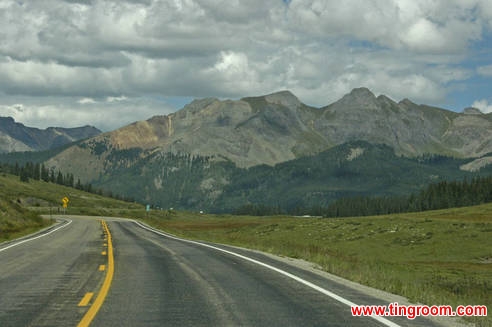-
(单词翻译:双击或拖选)
What Causes Altitude Sickness?
Anyone who has vacationed in the higher elevations1 of Colorado, such as Vail and Estes Park, will tell you altitude sickness can be a real problem. Loss of appetite, nausea2, vomiting3, weakness, dizziness, and difficulty sleeping can plague those visiting areas over eight thousand feet.

High Up
Altitude sickness results from the lack of oxygen at high elevations. At thirteen thousand feet, every lungful of air holds only sixty percent of what it would at sea level. Despite that fact, many indigenous4 people live in areas of low oxygen concentration with few adverse5 effects. The big question is, how do they survive?
The body can adapt to low oxygen levels by making more hemoglobin, an oxygen-carrying molecule6 in red blood cells. But too much hemoglobin over a long period of time can put a person at risk of blood clots7, stroke, or chronic8 mountain sickness.
Scientists wondered how mountain people can remain healthy living at high altitudes. To see if genes9 contribute, scientists analyzed10 the genomes of three ethnic11 groups living at altitudes over twelve thousand feet, two from Ethiopia, and Tibetans.
Oromo
One Ethiopian group, the Oromo, cope the same way lowlanders do, by making more hemoglobin. The Amhara and Tibetans, on the other hand, have hemoglobin levels ten percent lower than the Oromo. Does genetic12 variation account for this?
Scientists found that both the Amhara and Tibetan highlanders possessed13 genetic variants14 associated with low hemoglobin levels.
But they were not the same genes. It appears that each group took a different evolutionary15 path to achieve the same outcome of dampening the usual response of increased hemoglobin.
How about all those vacationers in Colorado? They will have to make do with their own lowland genes, for now.
点击 收听单词发音
收听单词发音
 收听单词发音
收听单词发音
1
elevations

|
|
| (水平或数量)提高( elevation的名词复数 ); 高地; 海拔; 提升 | |
参考例句: |
|
|
|
2
nausea

|
|
| n.作呕,恶心;极端的憎恶(或厌恶) | |
参考例句: |
|
|
|
3
vomiting

|
|
| 吐 | |
参考例句: |
|
|
|
4
indigenous

|
|
| adj.土产的,土生土长的,本地的 | |
参考例句: |
|
|
|
5
adverse

|
|
| adj.不利的;有害的;敌对的,不友好的 | |
参考例句: |
|
|
|
6
molecule

|
|
| n.分子,克分子 | |
参考例句: |
|
|
|
7
clots

|
|
| n.凝块( clot的名词复数 );血块;蠢人;傻瓜v.凝固( clot的第三人称单数 ) | |
参考例句: |
|
|
|
8
chronic

|
|
| adj.(疾病)长期未愈的,慢性的;极坏的 | |
参考例句: |
|
|
|
9
genes

|
|
| n.基因( gene的名词复数 ) | |
参考例句: |
|
|
|
10
analyzed

|
|
| v.分析( analyze的过去式和过去分词 );分解;解释;对…进行心理分析 | |
参考例句: |
|
|
|
11
ethnic

|
|
| adj.人种的,种族的,异教徒的 | |
参考例句: |
|
|
|
12
genetic

|
|
| adj.遗传的,遗传学的 | |
参考例句: |
|
|
|
13
possessed

|
|
| adj.疯狂的;拥有的,占有的 | |
参考例句: |
|
|
|
14
variants

|
|
| n.变体( variant的名词复数 );变种;变型;(词等的)变体 | |
参考例句: |
|
|
|
15
evolutionary

|
|
| adj.进化的;演化的,演变的;[生]进化论的 | |
参考例句: |
|
|
|

















